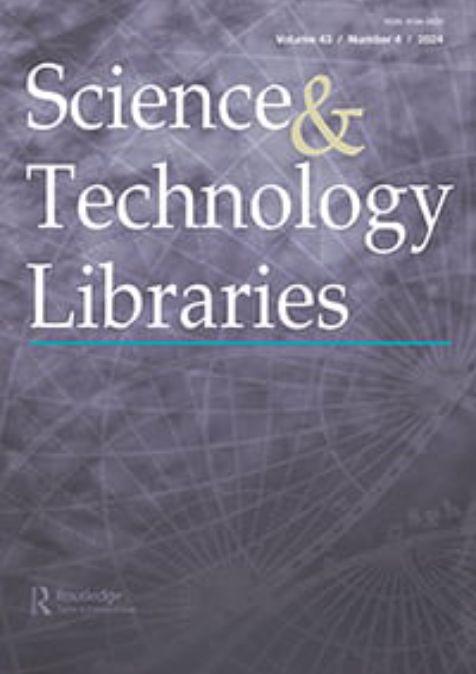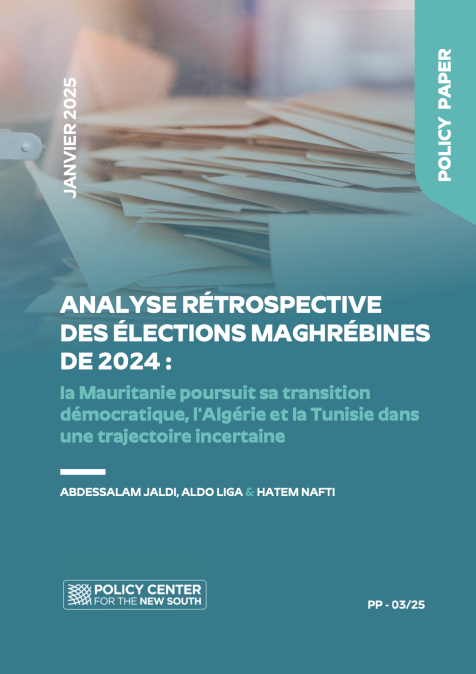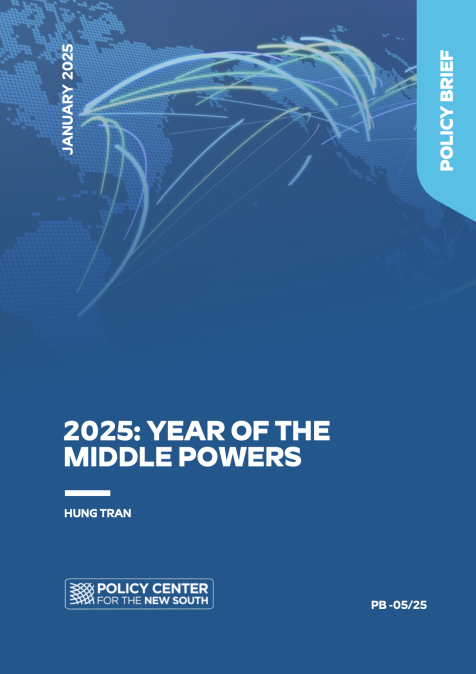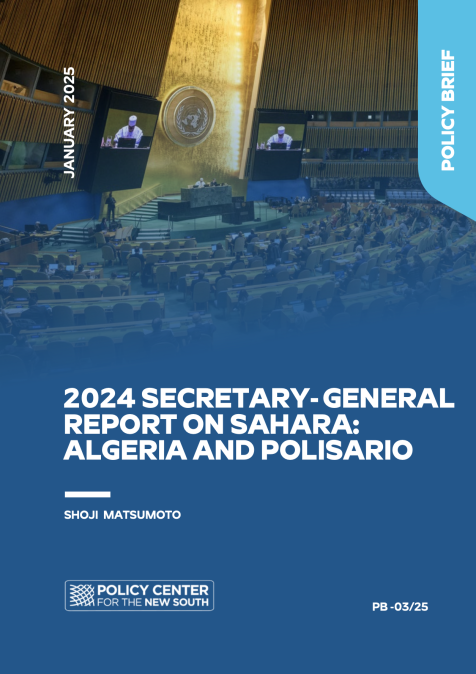RELATED CONTENT
-
AuthorsJanuary 28, 2025L'année 2024 a été marquée par des élections présidentielles cruciales en Algérie, en Mauritanie et en Tunisie. À Nouakchott, Mohamed Ould El- Ghazouani a été réélu avec 56 % des voix, malgré une baisse de participation, ce qui devrait lui permettre de poursuivre les réformes économiques et démocratiques structurelles. À Alger, Abdelmadjid Tebboune a obtenu sa réélection dans un climat de désillusion, avec une abstention record de 53,90 %, reflet des frustrations ...
-
January 28, 2025يخصص مركز السياسات من أجل الجنوب الجديد حلقة برنامجه الأسبوعي "حديث الثلاثاء" لمناقشة موضوع: تداعيات قرارات دونالد ترامب في ولايته الثانية على إفريقيا والعالم. شهد العالم يوم 20 يناير 2025 حدثًا بارزًا، وهو تنصيب دونالد ترامب رئيسًا للولايات المتحدة لولاية ثانية. ومنذ عودته إلى البيت ا...
-
AuthorsJanuary 27, 2025As geopolitical competition among superpowers intensifies, fragmenting the global economy and financial system, the role of middle powers has attracted much attention from policymakers and analysts. While there is no generally agreed list of middle powers, the term is intuitively understandable and has been used widely as referring to countries ranked below a handful of great powers, but significant enough to be able to act in response to external stimuli with some agency and with s ...
-
AuthorsJanuary 24, 2025Le 28 mai 2025, la CEDEAO (Communauté Économique des États de l’Afrique de l’Ouest) soufflera sa 50ème bougie, occasion propice pour revenir sur les réalisations et les échecs de cette Organisation régionale. Si l’on s’accorde à reconnaitre la CEDEAO comme une structure d’intégration réussie en Afrique, il n’en demeure pas moins que lui sont reprochés quelques défaillances et échecs. ...
-
Helmut Sorge, Najib BounahaiJanuary 24, 2025Social media has revolutionized access to culture, making previously inaccessible art forms, such as opera or theater, more widely available. While traditional methods of cultivating cult ...
-
January 23, 2025In this AD Special, former foreign ministers Ana Palacio from Spain and Erika Mouynes from Panama address key global affairs issues. One significant topic is Africa’s energy deficit, with over 700 million people lacking access to electricity. This situation necessitates private investme...
-
 AuthorsJanuary 23, 2025This paper was originaly published on tandfonline.com While Marie Curie’s unique presence among 29 male scientists at the 1927 Solvay Conference underscores the historical gender gap in science, the persistent underrepresentation of women in authorship of scientific publications – particularly in Africa and the Global South – highlights the enduring challenge of achieving gender equality in the scientific community. African women scientists represent 31.1% of the scientific comm ...
AuthorsJanuary 23, 2025This paper was originaly published on tandfonline.com While Marie Curie’s unique presence among 29 male scientists at the 1927 Solvay Conference underscores the historical gender gap in science, the persistent underrepresentation of women in authorship of scientific publications – particularly in Africa and the Global South – highlights the enduring challenge of achieving gender equality in the scientific community. African women scientists represent 31.1% of the scientific comm ... -
AuthorsInácio F. AraújoDina N. ElshahawanyJoão Gabriel SaccoMaria Carolina Rogelis-PradaAntonios PomonisGuillermo ToyosHogeun ParkJanuary 22, 2025This study evaluates the economic costs for three Egyptian coastal cities of catastrophic flooding resulting from either sea-level rise or intense rainfall. Using a computable general equilibrium (CGE) framework, we assess the higher-order impacts of physical capital loss on both regional and national economies. Leveraging global flood hazard maps for various scenarios and return periods, and a 100-meter-resolution buildings-exposure model, which estimates the replacement value of r ...
-
AuthorsJanuary 21, 2025According to the 2024 Secretary-General Report on Sahara (2024 Report), the biggest challenge may be the absence of progress in reaching a political solution to the Sahara Issue. Why has this conflict continued for half a century? In the 2024 Report, the Secretary-General has not attempted to give a stinging report on the resolution failure. The outline of the 2024 Report is largely as usual. Generally, to resolve a conflict, the proper parties should first be exactly identified. O ...
-
 AuthorsJanuary 20, 2025This paper (see pages: 181-186), included in the report 'Foresight Africa - Top Priorities for the Continent 2025-2030,' was originally published on brookings.edu In an increasingly fragmented world grappling with common challenges such as the global climate crisis, the Atlantic Ocean can be leveraged for Africa’s climate action, continental integration, contribution to the provision of global public goods, development, improved participation to the global economy, international ...
AuthorsJanuary 20, 2025This paper (see pages: 181-186), included in the report 'Foresight Africa - Top Priorities for the Continent 2025-2030,' was originally published on brookings.edu In an increasingly fragmented world grappling with common challenges such as the global climate crisis, the Atlantic Ocean can be leveraged for Africa’s climate action, continental integration, contribution to the provision of global public goods, development, improved participation to the global economy, international ...








